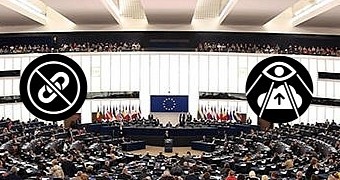The European Parliament approved the highly disputed amendments to the EU Copyright Directive, which are supposed to update the copyright law in EU for the Internet age we are currently going through, says Julia Reda.
EU MEPs voted for the changes underlined in the Copyright Directive Articles 11 and 13 which, according to its opponents, could mean the end of the Internet as we know because they're acting as automated censorship filters and link taxes.
According to them, Article 11 will force search engines to pay a direct tax to media organizations for directly linking to the information published in their articles, while Article 13 requires tech giants to create automated algorithms designed to monitor and prevent copyright infringements.
Opponents of the Article 11 amendment say that the Commision is actually targeting companies such as Google, Facebook, Twitter, and Pinterest which are known to use snippets of information from articles published by European media when linking to the content from their platforms.
The decision is not final, the amendments still have to go through the "trilogue" process and the final vote
Article 13 will force platforms who host massive quantities of content uploaded by their users such as YouTube to filter all contributions so that copyright infringement is nipped in the bud.
The biggest issue with this type of automated filters is that they are almost always prone to errors which usually end up being very costly.
Supporters of the two articles on the other hand claim that all the scenarios advanced inducing the idea that the Internet needs to be saved from the effects of the new European legislation are mere exaggerations.
It's important to mention that, even though approved by the European Parliament, the Copyright Directive amendments still have a very long way to go until taking effect.
The next step is the so-called "trilogue" process where closed-door negotiations between the Council, the Parliament, and the Commission are held, and the resulting law is subjected to a final vote in the EU Parliament during January 2019.

 14 DAY TRIAL //
14 DAY TRIAL //